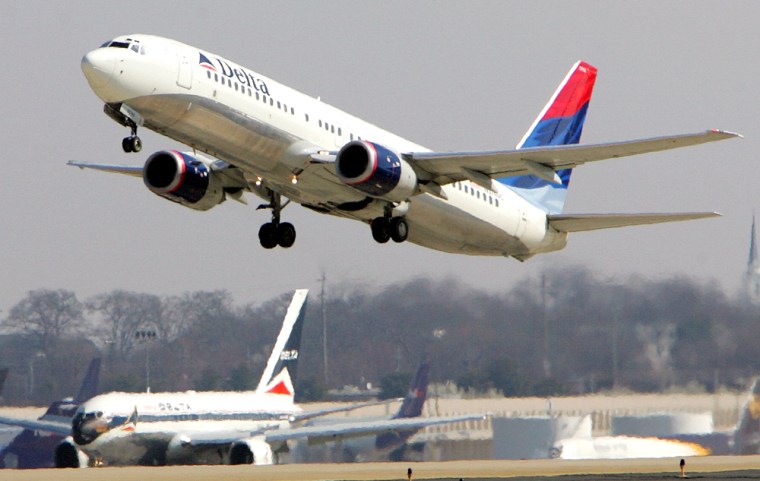So much for a smooth ride to recovery for the nation’s fragile airline industry.
Just when airlines are emerging from bankruptcy and starting to post the best profits since 2001, the industry’s future is shakier than ever. But it doesn’t take a crystal ball to see that consolidation is on the horizon. It’s just a matter of when and how.
Crude oil prices are climbing dangerously toward $100 a barrel. The U.S. economy is slowing. Airline stocks are sinking. And labor costs are soaring.
“That’s a recipe for restructuring in the industry,’’ said Vaughn Cordle, CEO of Airline Forecasts in Washington. “There are just too many airlines right now. If the jet-fuel prices hold, something else will have to give.”
That “something else” will most likely come in the form of mergers and higher air fares.
Published reports last week that centered on a possible marriage of No. 2 United and No. 3 Delta were just a hint of what the future may hold, even if that particular alliance never comes to fruition.
Despite some talk airlines might try to rush into merger talks before a new administration takes over, some industry experts say nothing is likely to happen anytime soon.
Publicly, major carriers appear unwilling to take on the headache of risky mergers. To do so would mean months of strategic planning and consultation over labor issues, operating structures and regulatory approvals. And that’s before the Justice Department’s review process, which can take another 18 months to two years.
“I find it unlikely that a merger could be approved" before a new administration takes over in 2009, Cordle said.
While many airline executives are publicly denying they are in merger talks, some are conceding that consolidation is in their future.
Goldman Sachs analyst Robert Barry wrote Thursday that “all airline management teams and boards have been discussing consolidation ad nauseam, for months if not longer.” United Airlines has made no secret that it would entertain a partnership. And Northwest has been open to talks as well. But so far, airlines have been all talk and no action.
“Everybody’s filling up their dance cards but nobody’s dancing yet,’’ said airline analyst Ray Neidl with Calyon Securities.
Eager institutional investors want to reverse that trend. Last week’s less-than-subtle advice for Delta to merge with United was the latest example of the pressure airlines are under today to boost profitability.
Pardus Capital Management LP, a hedge fund that owns 7 million Delta shares, publicly disclosed that it had written a letter to Delta, calling on the airline to consider a merger with United. Pardus also owned 5.6 million shares of UAL as of Sept. 30.
Pardus came across like a chaperone pushing a reluctant suitor onto the dance floor. And such investor demands will become more aggressive if fuel costs continue to chip away at airline profitability.
Delta CEO Richard Anderson issued a statement flatly denying that his airline was in merger talks with United but acknowledged that the airline is studying its strategic options.
He said Delta “believes that the right consolidation transaction could generate significant value for our shareholders and employees and that strategic options should be evaluated. With oil at over $90 a barrel, this analysis takes on a heightened importance as we factor those prices into our long-term planning process.”
Anderson told members of the Georgia congressional delegation Thursday that he wants Delta to remain headquartered in Atlanta should any merger take place down the road.
Delta is not the only airline under pressure from investors. American Airlines has been under increasing pressure to bolster share prices since September when FL Group, an Icelandic private equity group that owns 9.1 percent of parent company AMR, urged it to consider spinning off its frequent flyer program. The action, the group said, would be a “strategic alternative that would significantly increase shareholder value.”
The reignited talk of mergers, spinoffs and consolidation comes at a time when the U.S. airline industry is bouncing back from years of bankruptcy and plummeting profits. The post-9/11 downturn saw the bankruptcies of United parent UAL, Delta, Northwest and the former US Airways Group, which has merged with America West.
But in 2006, the industry posted its first profitable year since 2000, and analysts predict profits this year of $4 billion to $5 billion. That's compared with the cumulative $40 billion airlines lost in the previous six years.
The biggest problem facing airlines today is soaring oil costs, which boost the price of jet fuel — one of the top airline expenses. Oil prices rose above $95 a barrel Friday amid expectations that global crude supplies will remain tight.
Cordle, of Airline Forecasts, said every $10 increase in a barrel of crude oil translates to $3.4 billion in additional costs for the airline industry. The industry — which burned nearly 20 billion gallons of fuel last year — has offset some impact of higher fuel costs through better efficiency and fare increases. But analysts predict those actions might not be enough in the long run.
“We do not believe that consolidation is imminent, but when it comes, it will be fast and furious,” Neidl said last week in a Calyon Securities report. “Absent some major airlines terminating operations, which would take capacity out of the system, we believe the industry is ripe for consolidation. We do not need six nationwide, full-service airlines with all their overlapping expensive hub operations.”
Neidl said he remains leery about mergers, however, especially because they can be difficult, expensive and disruptive to complete.
Nevertheless, he said: “Once the starter gun goes off, there will probably be a mad rush to pair up.’’
